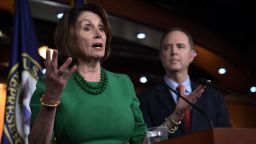Editor’s Note: In this weekly column “Cross-Exam,” Elie Honig, a CNN legal analyst and former federal and state prosecutor, gives his take on the latest legal news. Post your questions below. The views expressed in this commentary are his own. View more opinion on CNN. Watch Honig answer reader questions on “CNN Newsroom with Ana Cabrera” at 5:40 p.m. ET Sundays.
President Donald Trump has instructed his attorneys to sit out Wednesday’s House Judiciary Committee hearing on the “Constitutional Grounds for Presidential Impeachment,” apparently choosing to play the victim of an unfair process rather than engaging on the actual facts and merits of the case for impeachment. Even without the presence of Trump’s legal team, the hearing provides House Democrats with a valuable opportunity to drive home to Congress and the American public two fundamental points about impeachment that Trump has thus far succeeded in obscuring. This week’s hearing – if properly executed by House Democrats – can correct vital misconceptions that Trump and his supporters have perpetrated on the American public as a means to keep him in office at any cost.

First, contrary to Trump’s claims, impeachment is not a “coup.” It is not a forceful takeover of government but rather a fundamental feature of our constitutional democracy. The Constitution specifically provides for impeachment in both Articles I (establishing the legislative branch) and II (establishing the presidency and executive branch) as the government’s method to remove corrupt officials. While impeachment is among the most drastic remedies available to Congress, the American public should not fear impeachment or view it with dread. Impeachment is in the Constitution because the Founders meant for it to be there as a check on abuse or misuse of political power.
Second, Congress does not need to base impeachment on a statutory crime. While I believe Trump’s conduct does violate several federal criminal statutes, Congress need not prove that Trump committed any particular offense, but rather that he abused the power of the presidency. The phrase “treason, bribery, or other high crimes and misdemeanors” is among the most confusing and hotly debated in our Constitution, but the history and precedent behind the phrase make the Founders’ intent clear. The phrase comes from British Parliamentary practice, under which impeachment for non-criminal misconduct was common. The US House of Representatives has impeached federal officials for non-criminal malfeasance including “intoxication,” “favoritism” and “oppressive conduct.” President Andrew Johnson was impeached and tried (and acquitted in the Senate) on an article of impeachment for abuse of power, without reference to any crime. The House drafted Articles of Impeachment against former President Richard Nixon for abuse of power before he resigned. And the House considered (but voted down) a proposed Article of Impeachment against former President Bill Clinton for abuse of power.
Indeed, while criminal conduct can provide an especially powerful basis for impeachment, common sense dictates that it’s not necessary for impeachment. Take, for example, a president who wins election but then abrogates his Constitutional duties: he refuses to make appointments, conduct foreign policy, serve as commander in chief of the military, or sign legislation. That president commits no crime but plainly must be subject to removal for misuse of public office.
House Democrats need to be strategic in this week’s hearing. House Judiciary Chair Jerry Nadler already has made an unforced tactical error by failing to identify the specific expert witnesses who will testify on Wednesday before the Sunday deadline he gave to Trump’s lawyers to respond, leaving the door wide open for Trump’s attorneys to claim they cannot commit to attend without any knowledge of who will testify.
If Nadler makes an even bigger tactical mistake and allows testimony from Constitutional scholars to get too esoteric or theoretical, the message will be lost on the public and the end result could be more confusion about impeachment. But, focused properly, this week’s hearing has potential to drive home vital lessons about impeachment and its proper role in our system of Constitutional checks and balances.
Now, your questions
Donald (New York): Will witnesses such as Don McGahn who have refused to testify in the House finally be compelled to testify?
A federal district court judge ruled last week that the House’s subpoena on McGahn is valid and enforceable, rejecting the White House’s argument that executive branch officials are “absolutely immune” from compelled Congressional testimony. The judge pointedly noted that “Presidents are not kings” and that the White House’s concept of “absolute immunity” is “a fiction.”
The case is not over. McGahn already has appealed, and oral argument will be heard in the court of appeals on January 3. After that court rules, the losing party almost certainly will seek review in the Supreme Court, which may or may not agree to take the case. Either way, we likely will not have a final ruling until February 2020 at the absolute earliest. The question is whether House Democrats can afford to wait that long, given the pressing timetable for impeachment.
The McGahn ruling is particularly important because it seems to apply to other witnesses who have declined to testify: White House Chief of Staff Mick Mulvaney, former National Security Adviser John Bolton and Secretary of State Mike Pompeo. But if Republicans are intent to run out the clock, they still can challenge subpoenas to these witnesses by arguing they are somehow materially distinguishable from McGahn. Those arguments do not seem to hold much merit, but they could do the trick of bogging cases down in court and running out the clock.
Armando (California): Are Trump’s lawyers allowed to attend House impeachment hearings this week, and if so, do you think Trump will choose to have them participate?
Under House Resolution 660, Trump does have the right to be represented by attorneys at upcoming House Judiciary Committee proceedings, including Wednesday’s hearing on “Constitutional Grounds for Presidential Impeachment.”
However, after months of complaining that impeachment is “an illegitimate sham partisan process,” Trump has opted to sit out this week’s hearing (reserving his right to send attorneys to later Judiciary Committee proceedings). The strategy appears to be that, if Trump did send his attorneys, he would be expected to mount some substantive defense, whereas it might rally Trump’s supporters to wave the flag and cry procedural foul. The decision not to engage on the facts and substantive merits is consistent with Trump’s tendency thus far to steer public attention away from the actual evidence and towards his claims of victimization.
John (Canada): Assuming the House does not impeach or the Senate does not convict, can either still censure the President?
Yes, either the House or Senate can censure – formally reprimand – the President. The Constitution does not specifically provide for censure but either house of Congress has the ability to censure the President or other officials by a majority vote. The Senate has formally reprimanded a president only once – Andrew Jackson in 1834, over a dispute about the Bank of the United States; Jackson’s own Democratic party later expunged the reprimand in 1837 when it took control of the Senate. The House has reprimanded various officials but never a president.
It seems unlikely that either party would pursue censure if impeachment or removal fail in the House or Senate, respectively. Republicans would have little interest in censuring a President of their own party (though it could provide cover for those who have stated Trump’s conduct was bad but not impeachable). Democrats could seek censure as a last resort, but likely would be reluctant to pursue a purely symbolic consolation prize.
Three questions to watch this week:
Will Articles of Impeachment take shape, and will they include obstruction of Congress (based on Trump’s withholding of documents and blocking of witnesses) or obstruction of justice (based on Robert Mueller’s Russia investigation)?
Will Trump decide to have his legal team participate in the remainder of House Judiciary impeachment hearings?
Will a federal judge place a long-term hold on her ruling requiring former White House counsel Don McGahn to testify, pending completion of McGahn’s appeal?









